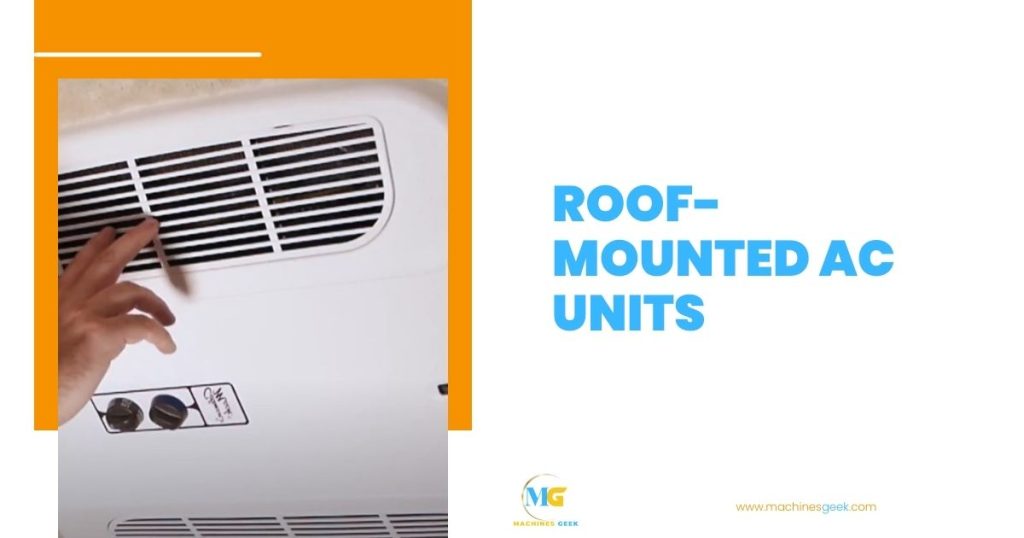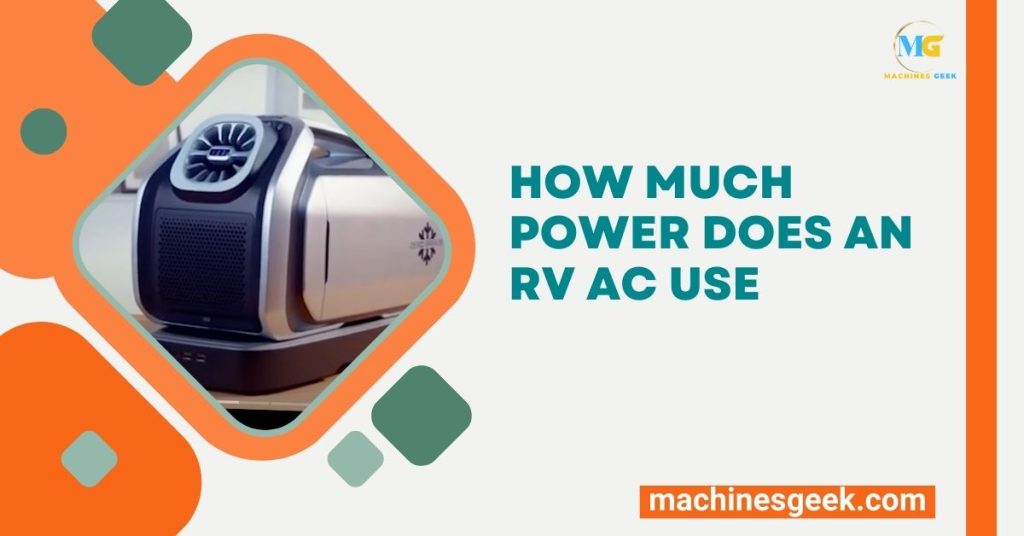How Much Power Does an RV AC Use? An RV AC typically uses an average power of 1,500 to 3,500 watts. RV air conditioners require a substantial amount of power to operate efficiently.
The power consumption of an RV AC unit usually ranges from 1,500 to 3,500 watts. This amount of power is necessary to cool down the interior of the vehicle effectively, especially during hot summer days. Understanding the power usage of an RV AC is crucial for RV owners to properly manage their energy resources while enjoying comfortable temperatures on their travels.
Different Types Of RV AC Units
RV AC units come in various types, each offering different features and power consumption levels. The three common types include:
Roof-mounted Ac Units

Roof-mounted AC units are the most popular choice for RV owners. These units are installed on the roof of the RV and provide efficient cooling. They typically have higher power consumption than other types, ranging from 1,000 to 3,500 watts.
Portable Ac Units
Portable AC units are a versatile option for RVs. They can be easily moved around and provide flexible cooling options. These units usually have lower power consumption, ranging from 500 to 1,500 watts.
Window Ac Units
Window AC units are another option for cooling RVs. They are installed in a window opening and are generally less expensive than roof-mounted units. Window AC units typically have power consumption levels similar to portable units, ranging from 500 to 1,500 watts.
Each type of RV AC unit has its advantages and considerations. It is important to choose the right unit based on your specific needs and power availability to ensure efficient and comfortable cooling during your RV adventures.
Factors Influencing RV Ac Power Consumption
Factors influencing the power consumption of an RV AC unit include its BTU rating, the ambient temperature, insulation of the RV, and thermostat settings.
The BTU rating of the AC unit is a measure of its cooling capacity. AC units with higher BTU ratings consume more power. The ambient temperature also plays a role, as hotter temperatures require the AC unit to work harder and consume more power.
The insulation of the RV is important in controlling power consumption. Proper insulation helps to maintain a consistent temperature inside the RV, reducing the workload on the AC unit and saving power.
Thermostat settings also affect power consumption. Setting the thermostat at lower temperatures will cause the AC unit to run more frequently and consume more power. On the other hand, setting the thermostat at higher temperatures can help save power.
Calculating Rv Ac Power Consumption
Calculating the power consumption of an RV AC is essential to know how much energy it will consume. Understanding AC wattage is the first step towards calculating this consumption. AC wattage refers to the amount of power the AC unit requires to function properly. It is important to convert wattage to amperage to have a better understanding of the unit’s power usage.
The conversion from wattage to amperage can be done by using the formula:
Amperage (A) = Wattage (W) / Voltage (V)
By dividing the wattage by the voltage, you will get the amperage consumed by the RV AC.
Once you have determined the amperage, you can calculate the AC usage in different scenarios. For example, if you are running the AC on a standard 120-volt power supply, you can calculate the amperage and multiply it by the number of hours the AC will be in use to get the total power consumed in ampere-hours. This calculation will give you an estimate of how much power your RV AC will consume in a given period.
Optimizing Rv Ac Power Usage
Proper maintenance of the AC unit is crucial for efficient power usage. Regularly clean or replace air filters to ensure consistent airflow. Keep the AC unit and its surroundings clean, removing any debris or obstructions that could hinder its performance. Seal any gaps or leaks in the RV to prevent cold air from escaping.
Setting the thermostat efficiently can significantly impact power usage. Instead of setting it at the lowest temperature, aim for a comfortable temperature that consumes less energy. Utilize the fan mode on milder days to circulate air without running the compressor.
Using additional cooling solutions can further optimize AC power usage. Installing reflective window shades or tinting can reduce heat buildup inside the RV. Consider using portable fans or roof vents to improve airflow and reduce the reliance on the AC unit.
By following these maintenance and operational tips, you can maximize RV AC power efficiency and enjoy a comfortable environment while minimizing energy consumption.
Power Supply Options For Rv Ac
| Options | Description |
|---|---|
| Shore power | This is the most common and convenient power supply option for RV AC units. It involves connecting your RV to a power source at campsites or RV parks using a power cord. The AC unit is powered directly from the electrical grid. |
| Generator power | In situations where shore power is not available, a generator can be used to supply power to the RV AC. Generators run on fuel, such as gasoline or propane, and produce electricity to power the AC unit, appliances, and other devices in the RV. |
| Solar power | RVs equipped with solar panels can harness solar energy to power their AC units. Solar panels convert sunlight into electricity, which is stored in batteries for use when the AC is in operation. Solar power is a renewable and eco-friendly option for powering RV AC. |
| Battery power | Some RVs are equipped with large battery banks that can power the AC unit for a limited time. Battery power is useful when camping in off-grid locations or during periods of low power supply. However, it is important to manage battery usage to avoid draining them completely. |
Common Rv Ac Power Faqs
Running an RV AC on battery power alone is not recommended as it requires a significant amount of power. On average, an RV AC draws around 13.5 amps when running. This means that using a smaller AC unit to save power would not be a viable solution as smaller units simply cannot provide the same level of cooling.
If you choose to use a portable AC unit instead, it is important to consider its impact on your RV’s electrical system. Portable ACs typically draw around 8 to 15 amps, which is within the capacity of most RV electrical systems. However, it is still important to make sure that your electrical system can handle the additional load.
- Can I run my RV AC on battery power alone?
- Running an RV AC on battery power alone is not recommended as it requires a significant amount of power.
- How much power does an RV AC draw on average?
- An RV AC draws around 13.5 amps when running.
- Can I use a smaller AC unit to save power?
- Using a smaller AC unit would not be a viable solution as smaller units simply cannot provide the same level of cooling.
- Will using a portable AC affect my RV’s electrical system?
- Portable ACs typically draw around 8 to 15 amps, so it is important to ensure that your electrical system can handle the additional load.
Frequently Asked Questions
How Much Power Does An Rv Ac Use?
An RV AC typically uses around 13. 5 to 15 amps of power when running. However, it’s important to consider factors like insulation and size of the AC unit for accurate power consumption.
Can An Rv Ac Run On A Generator?
Yes, an RV AC can run on a generator. You will need a generator with a wattage capacity that matches or exceeds the AC unit’s requirements to ensure smooth operation.
How Can I Reduce The Power Consumption Of My Rv Ac?
To reduce power consumption of your RV AC, consider using energy-efficient models, insulating your RV properly, using shades or curtains to block sunlight, and avoiding unnecessary use of other high-power appliances while the AC is running.
Conclusion
To sum up, understanding the power consumption of an RV AC is crucial for any RV owner. By knowing how much power it uses, you can ensure that you have sufficient power supply, avoid electrical issues, and optimize your energy efficiency.
Remember to consider factors like the size of the AC unit, the energy rating, and the type of generator you have. Regular maintenance and the use of energy-saving tips will also help you make the most out of your RV AC.
Happy travels!








